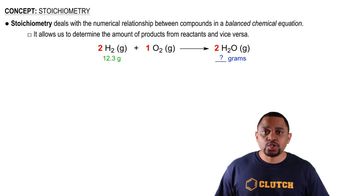For each of the following gas-phase reactions, indicate how the rate of disappearance of each reactant is related to the rate of appearance of each product:
(d) C2H5NH2(g) → C2H4(g) + NH3(g)
 Verified step by step guidance
Verified step by step guidance



For each of the following gas-phase reactions, indicate how the rate of disappearance of each reactant is related to the rate of appearance of each product:
(d) C2H5NH2(g) → C2H4(g) + NH3(g)
For each of the following gas-phase reactions, write the rate expression in terms of the appearance of each product and disappearance of each reactant:
(a) 2 H2O(g) → 2 H2(g) + O2(g)
(b) 2 SO2(g) + O2(g) → 2 SO3(g)
(c) 2 NO(g) + 2 H2(g) → N2(g) + 2 H2O(g)
(d) N2(g) + 2 H2(g) → N2H4(g)
(a) Consider the combustion of hydrogen, 2 H21g2 + O21g2 ¡ 2 H2O1g2. If hydrogen is burning at the rate of 0.48 mol>s, what is the rate of consumption of oxygen? What is the rate of formation of water vapor?
A reaction A + B → C obeys the following rate law: Rate = k[B]2. (a) If [A] is doubled, how will the rate change? Will the rate constant change?
A reaction A + B → C obeys the following rate law: Rate = k[B]2. (b) What are the reaction orders for A and B? What is the overall reaction order?